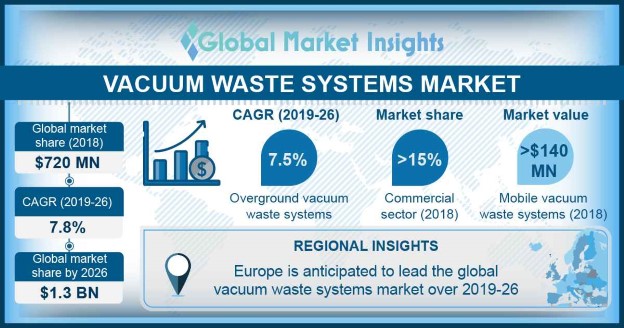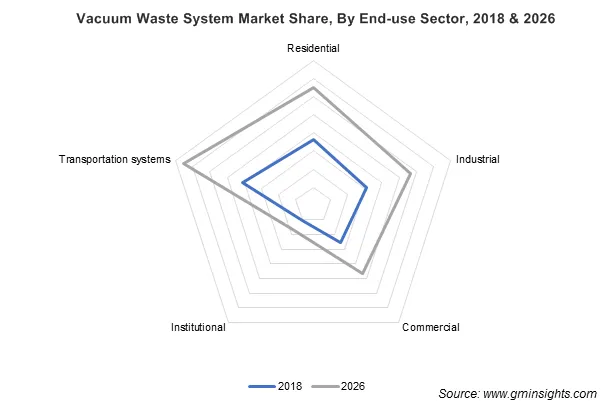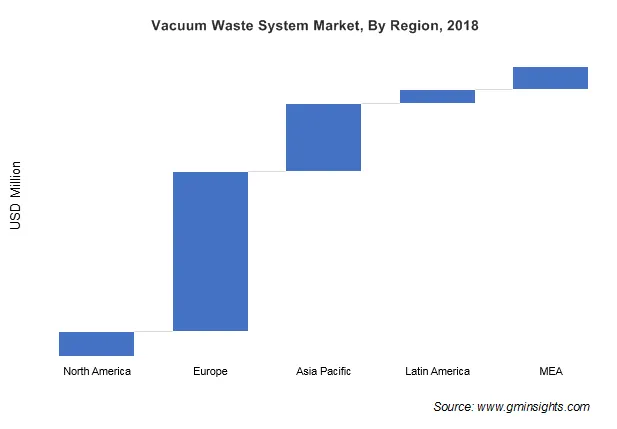Summary
Table of Content

Vacuum Waste Systems Market
Get a free sample of this report
Form submitted successfully!
Error submitting form. Please try again.
Thank you!
Your inquiry has been received. Our team will reach out to you with the required details via email. To ensure that you don't miss their response, kindly remember to check your spam folder as well!

Request Sectional Data
Thank you!
Your inquiry has been received. Our team will reach out to you with the required details via email. To ensure that you don't miss their response, kindly remember to check your spam folder as well!
Form submitted successfully!
Error submitting form. Please try again.
Vacuum Waste Systems Market Size
Vacuum Waste Systems Market size surpassed USD 720 million in 2018 and will exhibit growth of over 7.5% CAGR from 2019 to 2026.

To get key market trends
Achieving Sustainable Development Goals (SDG) by UN General Assembly, as a part of UN Resolution 70/1, transforming our world by 2030 will be an important factor to influence market growth globally.
Vacuum Waste Systems Market Report Attributes
| Key Takeaway | Details |
|---|---|
| Market Size & Growth | |
| Base Year | 2018 |
| Market Size in 2018 | 719.68 Million (USD) |
| Forecast Period 2019 to 2026 CAGR | 7.8% |
| Market Size in 2026 | 1,306.09 Million (USD) |
| Key Market Trends | |
| Growth Drivers |
|
| Pitfalls & Challenges |
|
What are the growth opportunities in this market?
United Nations Sustainable Development Goals will encourage market growth
Sustainable Development Goals (SDG) such as use of affordable & clean energy technology, promoting industrialization with resilient infrastructure, and shifting focus towards sustainable cities & communities will increase the demand of vacuum waste systems across the world.
Most of the modern automatic waste collection systems in developed economies collect waste by creating pressure in pipelines that conveys waste & recyclables in large containers, where the waste is compressed and sealed. When these containers are full, it is then transported away for separation and recycling. Thus, this trend will play a key role in driving the global vacuum waste systems market revenue during the next few years.
Vacuum Waste Systems Market Analysis
Rising population along with expanding urbanization will increase the demand of waste management services globally. Thus, use of these systems not only minimizes collection scheduling issues to bins but also reduces the vehicle distance travelled to collect waste from different locations. Moreover, it also minimizes vehicle access issues to busy or narrow streets.
Vacuum waste systems improve hygiene by litter reduction as no bin overflows ever, they also reduce odour and noise issues associated with waste collections vehicles. Moreover, these systems also minimize the operation cost and offer more amenity space on the ground.
The complexities associated with the adoption & implementation of such advanced technologies along with appropriate infrastructure. Additionally, high cost associated with its installation & maintenance may hamper the adoption these systems in the near term. However, increasing population along with rise in urbanization will propel the demand of vacuum waste system for waste collections & management services.
Vacuum waste systems market is segmented on the basis of surface position, product type and end-use sectors. Based on surface position it is further categorized into underground and over ground; and by product type it is classified into stationary and mobile vacuum waste systems, that finds wide applications in residential, commercial, industrial, institutional and transportation systems.
Underground vacuum waste system accounts for more than half of the overall revenue and the segment is likely to dominate its growth rate over the study timeframe, when compared to over ground systems.
Underground systems offer source-separated waste collection in places that lacks space for the storage containers or bins and also limits the accessibility of waste collection vehicles, that is required to collect several waste fractions for further dispose. This in turn will increase their demand in the near term.
The stationary vacuum waste system accounts for more than half of the market share and will continue its dominance through 2026. Stationary systems offer smooth operations throughout the year with minimal to no disruption. Moreover, they are also security advantageous as inlets in public realm can be fitted with automatic locking mechanism, which can be initiated remotely from the control system, which in turn will drive their growth.

Learn more about the key segments shaping this market
The residential sector accounts for one fourth of the market revenue and will grow at significant rate by 2026. Vacuum waste systems at residential areas handle wastes in minutes with improved recycled rates. Moreover, application of these systems in residential places requires less energy and low long-term maintenance costs, which in turn will further propel its demand in the sector over the coming years.

Learn more about the key segments shaping this market
Europe will dominate the vacuum waste systems market with the largest share during the projected timeframe owing to wide usage of these systems by various developed and developing countries such as Germany, France, Spain, Sweden, and Finland. Europe dominance in the market can also be attributed to presence of key product manufactures in the region, which reduces its dependence on the import of product.
Moreover, rising awareness towards clean environment and waste management services across various end-use sector of the region will further propel regional vacuum waste systems growth by 2026.
Vacuum Waste Systems Market Share
The vacuum waste systems industry displays a fair degree of competition among key manufacturers such as Envac AB, Marimatic, Logiwaste AB, Wartsila, MEIKO International, Jets Vacuum AS, Collins Aerospace and EVAC GmbH. These players are likely to witness stiff competition owing to the entry of new players.
Other prominent players in the market includes:
- Aqseptence Group GmbH
- EVAC Oy
- Nederman Holding AB
- ECOSIR Group
- Stream Environment SDN
- BHD
- Lundberg Tech A/S,
The market offers moderate profit margins and requires technical expertise & high investment for machinery and equipment
.
The vacuum waste systems market research report includes in-depth coverage of the industry with estimates & forecast in terms revenue in USD million from 2016 to 2026, for the following segments:
By Surface Position
- Underground
- Overground
By Product
- Stationary
- Mobile
By End-Use Sector
- Residential
- Industrial
- Commercial
- Institutional
- Transportation systems
The above information is provided on a regional basis for the following:
- North America
- U.S.
- Canada
- Europe
- Germany
- UK
- France
- Spain
- Italy
- Netherlands
- Sweden
- Norway
- Finland
- Denmark
- Russia
- Asia Pacific
- China
- India
- Japan
- Australia
- South Korea
- Latin America
- Brazil
- Mexico
- Middle East & Africa
- South Africa
- Saudi Arabia
- UAE
- Qatar
Frequently Asked Question(FAQ) :
Which product segment accounts for majority of the vacuum waste systems industry share?
The underground vacuum waste system accounts for more than half of the market share and the segment is likely to emerge dominant over the study timeframe, when compared to overground vacuum waste systems.
How much will the vacuum waste systems industry share grow during the forecast timeline?
The industry share of vacuum waste systems will exhibit growth of over 7.5% CAGR from 2019 to 2026.
Which region will dominate the vacuum waste systems market share till 2026?
Europe will dominate the market with the largest share in the projected timeframe owing to wide usage of these systems by various developed and developing countries such as Germany, France, Spain, Sweden, and Finland.
How much size did the global vacuum waste systems market register in 2019?
The market size of vacuum waste systems surpassed USD 720 million in 2018.
How much market revenue share does the residential end-use sector account for?
The residential sector accounts for one fourth of the global industry revenue and will grow at significant rate between 2019 and 2026, as vacuum waste systems at residential areas handle wastes in minutes with improved recycled rates.
Vacuum Waste Systems Market Scope
Related Reports


